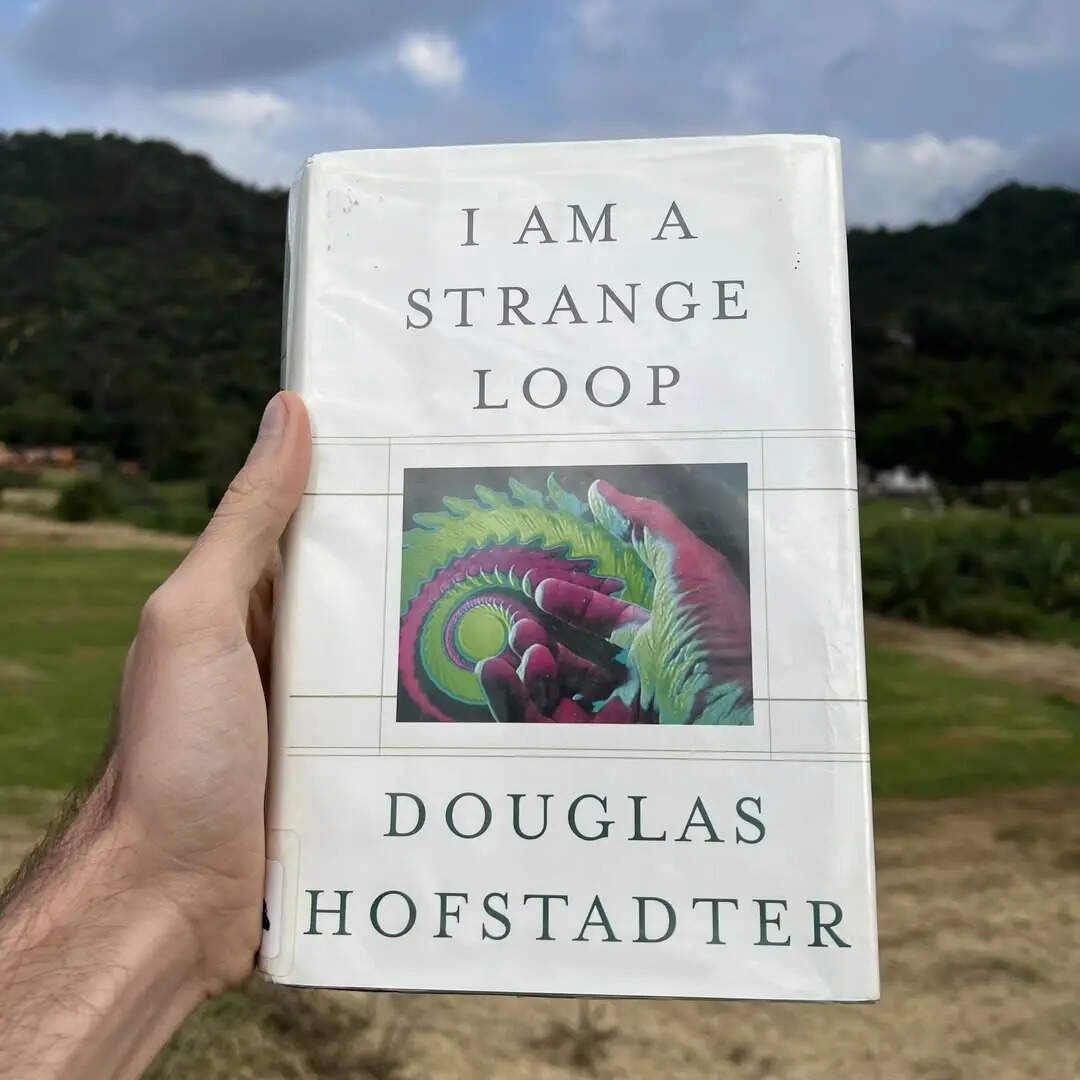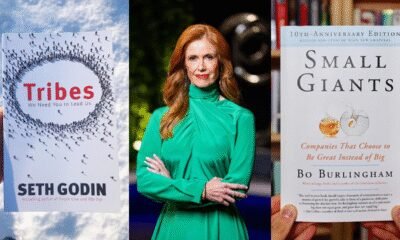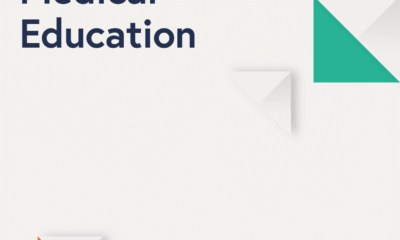Ethics & Policy
10 Philosophy Books That Will Make You Feel Like the Main Character in a Thought Experiment | Books

10 Philosophy Books That Will Make You Feel Like the Main Character in a Thought Experiment (Picture Credit – Instagram)
To be the main character in a thought experiment is to be suspended in a question that won’t let go. It means wrestling with impossible choices, chasing paradoxes, and wondering whether the you that thinks is the you that is. These books don’t just present philosophical arguments—they cast you inside them. With each page, you become Schrödinger’s reader: changed and unchanged, real and imagined, infinitely curious, caught between clarity and confusion, where meaning flickers like light between two mirrors facing each other.
1. The Mind’s I by Douglas Hofstadter & Daniel Dennett
A dazzling, kaleidoscopic collection of essays, stories, and reflections, this book asks what it means to be a self. Hofstadter and Dennett invite you to consider robots with souls, brains in vats, and whether consciousness can be duplicated. The experience is immersive and provocative without being pedantic. You’ll laugh, ponder, and spiral. Reading it feels like standing between two mirrors, watching your reflection fold into infinity. Every idea here is a door you’re dared to open and walk through.
2. I Am a Strange Loop by Douglas Hofstadter
A deeply personal meditation on the self, consciousness, and recursion, this book expands the work begun in ‘Gödel, Escher, Bach.’ Hofstadter argues that the self is a strange loop built from patterns in the brain that perceive themselves. It’s dense but warm, philosophical yet intimate. As you turn the pages, you begin to feel yourself as the experiment: Are you the loop? The loop’s author? Or simply the awareness that such a loop is even possible?

3. The Ethics of Ambiguity by Simone de Beauvoir
De Beauvoir writes with fire and clarity about freedom, responsibility, and the moral weight of ambiguity. Rather than providing neat solutions, she frames existence as a series of dilemmas that can only be approached in good faith. Her existentialism forces you to sit with discomfort, not resolve it. You are not a passive reader here—you’re implicated. In choosing, acting, or doing nothing at all, you become part of the philosophical drama she sketches and confronts.
4. Reasons and Persons by Derek Parfit
Few philosophy books are this rigorously mind-bending. Parfit takes on identity, ethics, and rationality, proposing puzzles about teleportation, future selves, and the moral weight of possible lives. Every argument seems to cancel the next, but that’s the point. You’re meant to wobble. Reading this feels like playing chess against yourself across different timelines. By the end, your ideas of personhood and moral duty won’t just be different—they might not survive intact or even feel coherent.
5. The Society of the Spectacle by Guy Debord
Debord’s critique of modern capitalist culture is as disorienting as it is prescient. He argues that we no longer live in reality, but in a world of images—a spectacle that mediates and manipulates experience. You are the subject, the object, and the observer, all at once. The book reads like a philosophical fever dream. It doesn’t ask for agreement; it demands reflection. Once inside Debord’s thesis, you won’t see media, politics, or even yourself the same way again.

6. The Order of Things by Michel Foucault
Foucault takes a hammer to the very idea of knowledge, showing how systems of thought are products of historical contingencies. It’s not an easy read, but it’s electric. He maps how we define madness, language, and human nature, not as truths but constructs. You become the pivot point: Where do you stand in the shifting architectures of thought? This book doesn’t give you answers. It gives you vertigo and a powerful urge to rethink everything.
7. Sum: Forty Tales from the Afterlives by David Eagleman
Short, sharp, and strange, these forty fictional afterlives each present a different metaphysical twist. In one, you meet God as a microbe. In another, you relive your life grouped by activity. Each tale is a thought experiment disguised as a story, but the emotional weight is real. The cumulative effect is unsettling and oddly comforting. You don’t just read the scenarios—you inhabit them. Eagleman turns philosophy into narrative, and you into its endlessly curious protagonist.
8. An Enquiry Concerning Human Understanding by David Hume
Hume’s classic work dismantles the certainty of causation, the trust in reason, and the idea of the self. And he does it with elegance. You are walked through why inductive reasoning might be unjustified, how habits form beliefs, and whether we know anything at all. It’s polite but devastating. Reading Hume is like having your mind remodelled room by room. You begin sure, end unsure, and in between, you become Hume’s silent partner in philosophical crime.
9. The Conquest of Happiness by Bertrand Russell
Russell’s humane, witty voice makes this exploration of joy, boredom, and purpose profoundly relatable. He argues for a kind of secular salvation: a happiness earned through curiosity, kindness, and clarity. You don’t just think about happiness—you start mapping your own. The book doesn’t pretend to be free of paradox, but it offers hope rooted in intellect. It feels less like advice and more like being taken on a walk with a very wise friend.
10. Being No One by Thomas Metzinger
This isn’t an easy book, but it’s a bold one. Metzinger proposes that there is no such thing as a self, only a self-model generated by the brain. Consciousness, in his view, is a phenomenal illusion. It’s dense, technical, and thrilling. As you move through it, you start to feel the destabilisation: If there’s no self, who’s reading this? You become the puzzle you’re trying to solve. The thought experiment is not in the book—it’s in you.

To read philosophy like this is to volunteer for disorientation. You walk in with questions and leave with better ones, shaped by paradoxes you didn’t know existed. Each book is a mirror, a maze, and a map that turns blank the moment you think you understand it. You aren’t a spectator to the ideas—they wrap around you, provoke you, and dare you to see from the inside out. If there’s a main character here, it’s you, constantly rewritten by every question you dare to ask.
Ethics & Policy
Your browser is not supported
jacksonville.com wants to ensure the best experience for all of our readers, so we built our site to take advantage of the latest technology, making it faster and easier to use.
Unfortunately, your browser is not supported. Please download one of these browsers for the best experience on jacksonville.com
Ethics & Policy
Navigating the Investment Implications of Regulatory and Reputational Challenges

The generative AI industry, once hailed as a beacon of innovation, now faces a storm of regulatory scrutiny and reputational crises. For investors, the stakes are clear: companies like Meta, Microsoft, and Google must navigate a rapidly evolving legal landscape while balancing ethical obligations with profitability. This article examines how regulatory and reputational risks are reshaping the investment calculus for AI leaders, with a focus on Meta’s struggles and the contrasting strategies of its competitors.
The Regulatory Tightrope
In 2025, generative AI platforms are under unprecedented scrutiny. A Senate investigation led by Senator Josh Hawley (R-MO) is probing whether Meta’s AI systems enabled harmful interactions with children, including romantic roleplay and the dissemination of false medical advice [1]. Leaked internal documents revealed policies inconsistent with Meta’s public commitments, prompting lawmakers to demand transparency and documentation [1]. These revelations have not only intensified federal oversight but also spurred state-level action. Illinois and Nevada, for instance, have introduced legislation to regulate AI mental health bots, signaling a broader trend toward localized governance [2].
At the federal level, bipartisan efforts are gaining momentum. The AI Accountability and Personal Data Protection Act, introduced by Hawley and Richard Blumenthal, seeks to establish legal remedies for data misuse, while the No Adversarial AI Act aims to block foreign AI models from U.S. agencies [1]. These measures reflect a growing consensus that AI governance must extend beyond corporate responsibility to include enforceable legal frameworks.
Reputational Fallout and Legal Precedents
Meta’s reputational risks have been compounded by high-profile lawsuits. A Florida case involving a 14-year-old’s suicide linked to a Character.AI bot survived a First Amendment dismissal attempt, setting a dangerous precedent for liability [2]. Critics argue that AI chatbots failing to disclose their non-human nature or providing false medical advice erode public trust [4]. Consumer advocacy groups and digital rights organizations have amplified these concerns, pressuring companies to adopt ethical AI frameworks [3].
Meanwhile, Microsoft and Google have faced their own challenges. A bipartisan coalition of U.S. attorneys general has warned tech giants to address AI risks to children, with Meta’s alleged failures drawing particular criticism [1]. Google’s decision to shift data-labeling work away from Scale AI—after Meta’s $14.8 billion investment in the firm—highlights the competitive and regulatory tensions reshaping the industry [2]. Microsoft and OpenAI are also reevaluating their ties to Scale AI, underscoring the fragility of partnerships in a climate of mistrust [4].
Financial Implications: Capital Expenditures and Stock Volatility
Meta’s aggressive AI strategy has come at a cost. The company’s projected 2025 AI infrastructure spending ($66–72 billion) far exceeds Microsoft’s $80 billion capex for data centers, yet Meta’s stock has shown greater volatility, dropping -2.1% amid regulatory pressures [2]. Antitrust lawsuits threatening to force the divestiture of Instagram or WhatsApp add further uncertainty [5]. In contrast, Microsoft’s stock has demonstrated stability, with a lower average post-earnings drawdown of 8% compared to Meta’s 12% [2]. Microsoft’s focus on enterprise AI and Azure’s record $75 billion annual revenue has insulated it from some of the reputational turbulence facing Meta [1].
Despite Meta’s 78% earnings forecast hit rate (vs. Microsoft’s 69%), its high-risk, high-reward approach raises questions about long-term sustainability. For instance, Meta’s Reality Labs segment, which includes AI-driven projects, has driven 38% year-over-year EPS growth but also contributed to reorganizations and attrition [6]. Investors must weigh these factors against Microsoft’s diversified business model and strategic investments, such as its $13 billion stake in OpenAI [3].
Investment Implications: Balancing Innovation and Compliance
The AI industry’s future hinges on companies’ ability to align innovation with ethical and legal standards. For Meta, the path forward requires addressing Senate inquiries, mitigating reputational damage, and proving that its AI systems prioritize user safety over engagement metrics [4]. Competitors like Microsoft and Google may gain an edge by adopting transparent governance models and leveraging state-level regulatory trends to their advantage [1].
Conclusion
As AI ethics and legal risks dominate headlines, investors must scrutinize how companies navigate these challenges. Meta’s struggles highlight the perils of prioritizing growth over governance, while Microsoft’s stability underscores the value of a measured, enterprise-focused approach. For now, the AI landscape remains a high-stakes game of regulatory chess, where the winners will be those who balance innovation with accountability.
Source:
[1] Meta Platforms Inc.’s AI Policies Under Investigation and [https://www.mintz.com/insights-center/viewpoints/54731/2025-08-22-meta-platforms-incs-ai-policies-under-investigation-and]
[2] The AI Therapy Bubble: How Regulation and Reputational [https://www.ainvest.com/news/ai-therapy-bubble-regulation-reputational-risks-reshaping-mental-health-tech-market-2508/]
[3] Breaking down generative AI risks and mitigation options [https://www.wolterskluwer.com/en/expert-insights/breaking-down-generative-ai-risks-mitigation-options]
[4] Experts React to Reuters Reports on Meta’s AI Chatbot [https://techpolicy.press/experts-react-to-reuters-reports-on-metas-ai-chatbot-policies]
[5] AI Compliance: Meaning, Regulations, Challenges [https://www.scrut.io/post/ai-compliance]
[6] Meta’s AI Ambitions: Talent Volatility and Strategic Reorganization—A Double-Edged Sword for Investors [https://www.ainvest.com/news/meta-ai-ambitions-talent-volatility-strategic-reorganization-double-edged-sword-investors-2508/]
Ethics & Policy
7 Life-Changing Books Recommended by Catriona Wallace | Books

7 Life-Changing Books Recommended by Catriona Wallace (Picture Credit – Instagram)
Some books ignite something immediate. Others change you quietly, over time. For Dr Catriona Wallace—tech entrepreneur, AI ethics advocate, and one of Australia’s most influential business leaders, books are more than just ideas on paper. They are frameworks, provocations, and spiritual companions. Her reading list offers not just guidance for navigating leadership and technology, but for embracing identity, power, and inner purpose. These seven titles reflect a mind shaped by disruption, ethics, feminism, and wisdom. They are not trend-driven. They are transformational.
1. Lean In by Sheryl Sandberg
A landmark in feminist career literature, Lean In challenges women to pursue their ambitions while confronting the structural and cultural forces that hold them back. Sandberg uses her own journey at Facebook and Google to dissect gender inequality in leadership. The book is part memoir, part manifesto, and remains divisive for valid reasons. But Wallace cites it as essential for starting difficult conversations about workplace dynamics and ambition. It asks, simply: what would you do if you weren’t afraid?

2. Women and Power: A Manifesto by Mary Beard
In this sharp, incisive book, classicist Mary Beard examines the historical exclusion of women from power and public voice. From Medusa to misogynistic memes, Beard exposes how narratives built around silence and suppression persist today. The writing is fiery, brief, and packed with centuries of insight. Wallace recommends it for its ability to distil complex ideas into cultural clarity. It’s a reminder that power is not just a seat at the table; it is a script we are still rewriting.
3. The World of Numbers by Adam Spencer
A celebration of mathematics as storytelling, this book blends fun facts, puzzles, and history to reveal how numbers shape everything from music to human behaviour. Spencer, a comedian and maths lover, makes the subject inviting rather than intimidating. Wallace credits this book with sparking new curiosity about logic, data, and systems thinking. It’s not just for mathematicians. It’s for anyone ready to appreciate the beauty of patterns and the thinking habits that come with them.
4. Small Giants by Bo Burlingham
This book is a love letter to companies that chose to be great instead of big. Burlingham profiles fourteen businesses that opted for soul, purpose, and community over rapid growth. For Wallace, who has founded multiple mission-driven companies, this book affirms that success is not about scale. It is about integrity. Each story is a blueprint for building something meaningful, resilient, and values-aligned. It is a must-read for anyone tired of hustle culture and hungry for depth.
5. The Misogynist Factory by Alison Phipps
A searing academic work on the production of misogyny in modern institutions. Phipps connects the dots between sexual violence, neoliberalism, and resistance movements in a way that is as rigorous as it is radical. Wallace recommends this book for its clear-eyed confrontation of how systemic inequality persists beneath performative gestures. It equips readers with language to understand how power moves, morphs, and resists change. This is not light reading. It is a necessary reading for anyone seeking to challenge structural harm.
6. Tribes by Seth Godin
Godin’s central idea is simple but powerful: people don’t follow brands, they follow leaders who connect with them emotionally and intellectually. This book blends marketing, leadership, and human psychology to show how movements begin. Wallace highlights ‘Tribes’ as essential reading for purpose-driven founders and changemakers. It reminds readers that real influence is built on trust and shared values. Whether you’re leading a company or a cause, it’s a call to speak boldly and build your own tribe.
7. The Tibetan Book of Living and Dying by Sogyal Rinpoche
Equal parts spiritual guide and philosophical reflection, this book weaves Tibetan Buddhist teachings with Western perspectives on mortality, grief, and rebirth. Wallace turns to it not only for personal growth but also for grounding ethical decision-making in a deeper sense of purpose. It’s a book that speaks to those navigating endings—personal, spiritual, or professional and offers a path toward clarity and compassion. It does not offer answers. It offers presence, which is often far more powerful.

The books that shape us are often those that disrupt us first. Catriona Wallace’s list is not filled with comfort reads. It’s made of hard questions, structural truths, and radical shifts in thinking. From feminist manifestos to Buddhist reflections, from purpose-led business to systemic critique, this bookshelf is a mirror of her own leadership—decisive, curious, and grounded in values. If you’re building something bold or seeking language for change, there’s a good chance one of these books will meet you where you are and carry you further than you expected.
-
Tools & Platforms3 weeks ago
Building Trust in Military AI Starts with Opening the Black Box – War on the Rocks
-

 Business2 days ago
Business2 days agoThe Guardian view on Trump and the Fed: independence is no substitute for accountability | Editorial
-

 Ethics & Policy1 month ago
Ethics & Policy1 month agoSDAIA Supports Saudi Arabia’s Leadership in Shaping Global AI Ethics, Policy, and Research – وكالة الأنباء السعودية
-

 Events & Conferences3 months ago
Events & Conferences3 months agoJourney to 1000 models: Scaling Instagram’s recommendation system
-

 Jobs & Careers2 months ago
Jobs & Careers2 months agoMumbai-based Perplexity Alternative Has 60k+ Users Without Funding
-

 Funding & Business2 months ago
Funding & Business2 months agoKayak and Expedia race to build AI travel agents that turn social posts into itineraries
-

 Education2 months ago
Education2 months agoVEX Robotics launches AI-powered classroom robotics system
-

 Podcasts & Talks2 months ago
Podcasts & Talks2 months agoHappy 4th of July! 🎆 Made with Veo 3 in Gemini
-

 Podcasts & Talks2 months ago
Podcasts & Talks2 months agoOpenAI 🤝 @teamganassi
-

 Mergers & Acquisitions2 months ago
Mergers & Acquisitions2 months agoDonald Trump suggests US government review subsidies to Elon Musk’s companies



















